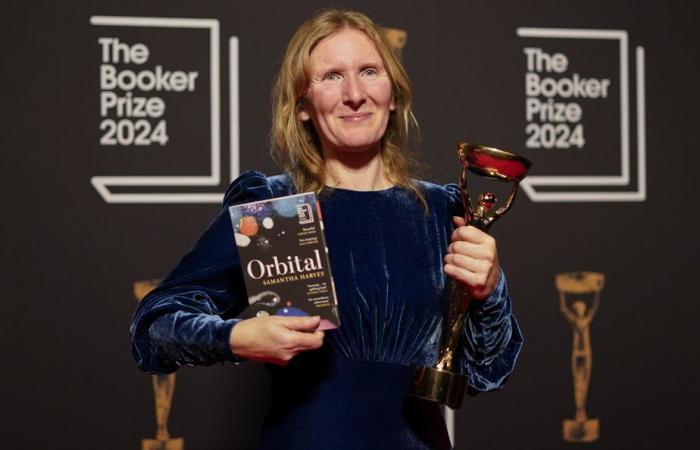(London) The novel Orbitalawarded the prestigious Booker Prize literary prize, was born from the fascination of its author, the British Samantha Harvey, for live videos from the International Space Station, she said Thursday in an interview with AFP.
Posted yesterday at 12:02 p.m.
Clara LALANNE
Agence France-Presse
Lyrical and contemplative, this book recounts a day aboard the famous ISS station, to the rhythm of the 16 auroras that the astronauts observe during their rotation around the Earth.
“This choice may seem a little eccentric, because I knew nothing about space, although it had always interested me,” says Samantha Harvey, who says she is still “euphoric” and “incredulous”.
The 49-year-old novelist, however, did not feel the need to interact with astronauts, instead immersing herself in their often “very beautiful” writings on space and intensive research.
His main source of inspiration? The live video feed from the ISS, which mixes views of Earth and station occupants going about their tasks.
This direct “allows you to travel with the astronauts all around the Earth. This is what I did for years: traveling every day,” says the author.
“I think this novel is more about Earth than space,” she emphasizes, however.
“It allowed me to write about time, upheaval and the strange experience of time, which interested me in all my novels”, since his first work The Wildernesspublished in 2009.
“Symbol of peace”
The Booker Prize jury crowned this melancholy novel, an ode to the beauty and fragility of the Earth, in the middle of the UN COP29 climate conference, and a few days after the re-election of Donald Trump, a notorious climate skeptic, to the House- White.
Samantha Harvey, however, says she wrote Orbital with no other intention than to create a “visual, pictorial” work, while being aware that the question of climate change would naturally arise, like that of the preservation of space.
“We are exploiting and destroying it, in the same way that we have exploited and trashed this planet,” she says, calling for “action.”
“My responsibility is aesthetic […] If this book were to have a positive impact, to contribute to change, I would be absolutely delighted, but I think it is beyond my skills.”
When the author finished Orbitalpartly written during the lockdown, Russia’s invasion of Ukraine had not yet taken place.
But “it was already obvious that this peace project that is the ISS”, bringing together Russian, American or European astronauts, “was becoming more and more constrained”.
“We know that the ISS will be decommissioned within a few years […] and I feel like there is something very poignant about the fact that this beautiful symbol of peace, of post-Cold War cooperation, is falling apart,” she commented. .
The English author, already immersed in writing her next novel, is struggling to anticipate what impact the Booker Prize will have, the promise of international fame synonymous with success in bookstores.
“There is no greater validation of someone’s career, of their work, than this award. I want to draw all the confidence and courage possible from it,” without letting any form of “external pressure” take hold, she emphasizes.
This year, five of the six finalists for the Booker Prize were women: Rachel Kushner, Anne Michaels, Charlotte Wood, Yael van der Wouden and Samantha Harvey, the first prize-winning author since 2019.
According to her, this is the culmination of “a change that has taken place in the sector over the last two or three decades […] it manifests itself, comes to fruition, and I think we should rejoice in it.”






